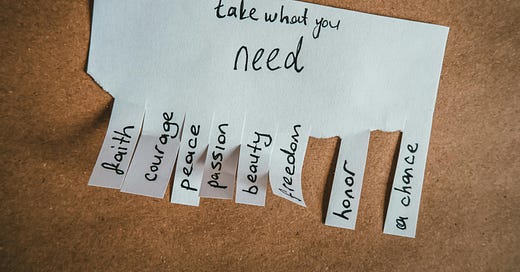I’m not always the most popular mom, if you want the truth. I have four teenagers, and they’re sometimes not thrilled with my decisions. Case in point: phones. I’m pretty strict about them. They get a dumb phone starting in 7th grade, then a stripped-down smart phone with no internet or social media for the first two years of high school. Junior year, one social media app. Senior year, internet and social media. They say they have the most limited phone set-up of anyone in school… and they might be right.
One of my kids and I talk about this fairly regularly; she’ll say she wishes I trust her more because she’s using her phone harmlessly. It’s not about trust, I say… because it isn’t. It’s about the virtues.
What does that mean?, you ask. Feels like a non sequitur. I’ll explain.
I didn't get how virtues worked until pretty recently. “Good character traits,” of course - I knew that. We all know that. But I didn't know how you got them.
You develop a virtue by taking action toward a thing that's objectively good. The virtue crops up as a byproduct.
You practice piano to learn how to make beautiful music; you develop diligence.
You set your mind to gain new knowledge (algebra, French, how to knit); you develop perseverance.
You cultivate a close, positive friendship; you develop loyalty.
You jump in a pool to preserve a toddler's life; you develop courage.
The goods in these cases are beauty, knowledge, friendship, and life. The virtues that emerge as you pursue them are diligence, perseverance, loyalty, courage. People who have these qualities flourish more in their lives than people who don't; they're better off. This we learn from natural law - the set of universal truths, derived from nature, common to all humans, discovered through reason.
You actually can't cultivate virtues just by trying. You can't just tell yourself, “be courageous!” and have it happen. It doesn't work that way. The virtue is built organically as you pursue the good.
The main reason most people (especially kids and teens) use phones is for amusement. We scroll social media, watch things, text our friends funny GIFs. They're a way to gain a short-term pleasure. But when we use our phones to sidestep boredom, to entertain ourselves, it's not just that we waste time that we could use to do more productive things (which matters). It's that we have no opportunity to develop virtue, to build positive traits within ourselves… because we aren't pursuing goods when we're on our phones. Not pursuing beauty, friendship, justice, life, knowledge, play. We're just hanging out.
Because of this, using your phone won't make you a better person, in the vast majority of cases, and won't help you flourish.
And at the same time, frequently using your phone will make you a worse person. It will often cultivate habits of self-absorption, insecurity, pettiness, vanity, and laziness. These are vices, the opposite of virtues. Vices emerge as we take actions away from the good – in this case, entertain ourselves excessively, especially as we use social media.
Consider these reflections from 24-year-old Freya India, who argues that social media doesn’t just diminish our mental health, it makes us worse people. She says:
“People will insist that you can use social media selectively, for good things. You just have to be smart with it. Sure! Maybe you’ve trained your algorithm to deliver you diet videos and exercise tips and positive affirmations… it’s still all about you. It’s all about your self-improvement. Still a constant, even subconscious reminder to think about yourself. Even healthier algorithms and platforms all have the same problem: you are the centre. What are you thinking about? What’s on your mind?
…(We need) to change the way we talk about social media. Not just about our vulnerabilities but our vices. Not just about our anxiety but our arrogance. And to look at ourselves, honestly, all of us, and think, for once, not only about how all this is making us feel. But who the hell is it making us become?”
Who indeed.
And Freya’s question is 100% the right one, by the way – who is it making us become? Who we become is determined by if we pursuing goods, or not. We want to become people who flourish in a comprehensive way – that’s a life spent pursuing the good. We want not to become people who flounder and deteriorate – that’s a life apart from the goods.
So now you know my phone rationale and how it’s tied to virtues. My kids and I agree to disagree on this one. And I’m OK with it.





Possibly me least favorite response from my teens on anything was, "trust me." This applied to driving restrictions, phone or computer limitations, curfews, food choices. Pretty much any limitation we'd set was countered with the trust card. And they clearly felt it was a powerful card. If I didn't trust them, I must not truly love them. If I didn't trust them I wasn't allowing them to grow up. The more argumentative ones (OK, all of them) would resort to scripture. Love trusts... This has sensitized me to how many movies/tv shows and novels will have some point where one character realizes they need to "just trust" someone (generally a love interest - but sometimes their child - I can't think of a time when it was their parent) and then everything works out. Spideman catches them, the wormhole opens up just in time, they make the jump safely. Trying to convince them trust is something else entirely was hard. Especially when I am not always sure myself. Still I knew that love wasn't letting them go down a road I knew was dangerous, or a road I didn't "trust myself" on! I don't miss that :)